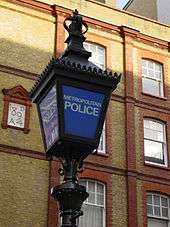Counter Terrorism Command
Counter Terrorism Command (CTC) or SO15 is a Specialist Operations branch within London's Metropolitan Police Service.[1] Counter Terrorism Command was established as a result of the merging of the Anti-Terrorist Branch (SO13) and Special Branch (SO12) in October 2006, bringing together intelligence, operations, and investigative functions to form a single command.[1] CTC has over 1,500 police officers and staff, and a number of investigators based overseas.
Commander Richard Smith is the head of Counter Terrorism Command and reports to the Senior National Co-ordinator, Deputy Assistant Commissioner Dean Haydon.[2][3]
Counter Terrorism Command is also the host of the National Counter Terrorism Policing Network headquarters.
Responsibilities
According to Counter Terrorism Command's website,[1] the Command’s overriding priority is to keep the public safe and to disrupt terrorist-related activity in the United Kingdom and against UK interests overseas by:
- Detecting, investigating, and preventing terrorist threats and networks.
- Working with partner agencies to acquire and use intelligence and evidence about terrorism and extremism.
- Ensuring that Counter Terrorism Command activity is focused, delivering value for money, productivity and an efficient and effective use of our resources.
- Engaging, building and maintaining working relationships with boroughs, local communities, national and international partners to better understand their needs and to use their expertise and experience in jointly combating the terrorist threat.
- Working with communities, partners, institutions, groups and other agencies providing advice and support to tackle the ideologies that drive terrorism and extremism.
- Supporting, working and collaborating within the National Counter Terrorism Network to deliver UK counter-terrorism policing.
The Counter Terrorism Command has a number of other national security functions. It has the national lead for domestic extremism, a role undertaken by the National Domestic Extremism Unit. It also deals with sensitive national security investigations, such as Official Secrets Act enquiries, the investigation of war crimes and crimes against humanity, and politically motivated murders.[1]
Counter Terrorism Command is part of the National Counter Terrorism Network which consists of five Counter Terrorism Units (CTUs) and smaller regional units.[4][5] It is overseen by the counter-terrorism coordination committee, chaired by Assistant Commissioner Neil Basu of the Metropolitan Police Service.[4] As part of its role in the National Counter Terrorism Network, SO15 operate against the threat of terrorism at a local, national, and international level and engages with a range of partners to prevent terrorist related activity, including the Security Service (MI5) and Secret Intelligence Service (MI6).[1]
History
The first counter terrorist unit at Scotland Yard was commissioned in 1883 by the then Home Secretary Sir William Harcourt; the Irish Bureau, or Special Irish Branch as it became known, consisted of just 12 detectives with a mission to defeat the "Fenian" terrorist campaign that had been on-going in London and across the country. In November 2013 this Counter Terrorism Command in its current format (SO15) comprises 1790 staff including 1350 police officers and 600 detectives working in 75 specialist units with the capability to respond proactively or reactively anywhere in the world.
Counter Terrorism Command in its various guises has been responsible for investigating several high-profile terrorist incidents since its inception, including:
- General Post Office Tower bombing (1971)
- Balcombe Street siege (1975)
- Iranian Embassy siege (1980)
- Hyde Park and Regent's Park bombings (1982)
- Harrods bomb (1983)
- Libyan Embassy siege (1984)
- Brighton bomb (1984)
- Nezar Hindawi attempted bombing of El Al flight from Heathrow to Israel (1986)
- Downing Street mortar attack (1991)
- Bishopsgate bomb (1993)
- Heathrow mortar attacks (1994)
- Canary Wharf bomb (1996)
- David Copeland bombing campaign (1999)
- Richard Reid, the shoe bomber (2001)
- 7/7 London bombings and 21/7 attempted bombings (2005)
- Transatlantic flight bomb plot (2006)
- Cargo planes bomb plot or "Printer bomb" (2010)
- 2017 Westminster attack
- Manchester Arena bombing (2017)
- 2017 London Bridge attack
- Poisoning of Sergei and Yulia Skripal, 2018 Amesbury poisonings
- 2020 Forbury Gardens stabbings
Through the International Operations branch of Counter Terrorism Command, SO15 has proactively deployed officers around the world as well as in response to terrorist incidents in support of host countries and to investigate when British nationals are the victims of acts of terrorism. Such investigations include:
- Kidnap of Judith Tebbutt and the murder of David Tebbutt in Kenya (2012)
- In Amenas siege (2013)
- Westgate siege in Nairobi (2013)
- Sousse attacks in Tunisia (2015)[6]
See also
- Joint Terrorism Analysis Centre
- MI5
- MI6
- National Counter Terrorism Security Office
- National Extremism Tactical Coordination Unit
References
- "Counter Terrorism Command website". Counter Terrorism Command. MPS. Retrieved 2015-12-16.
- "New Head of the Met's Counter Terrorism Command". Retrieved 2019-09-19.
- "Dean Haydon appointed as Senior National Coordinator for Counter Terrorism Policing". Retrieved 2019-09-19.
- "Counter-terrorism". Counter Terrorism Policing. Retrieved 2019-02-06.
- "Background | CTU". Counter Terrorism Police - North East. Retrieved 2019-02-06.
- Walton, Richard (November 2013). 130 years of Counter Terrorism Policing at Scotland Yard. SO15.
